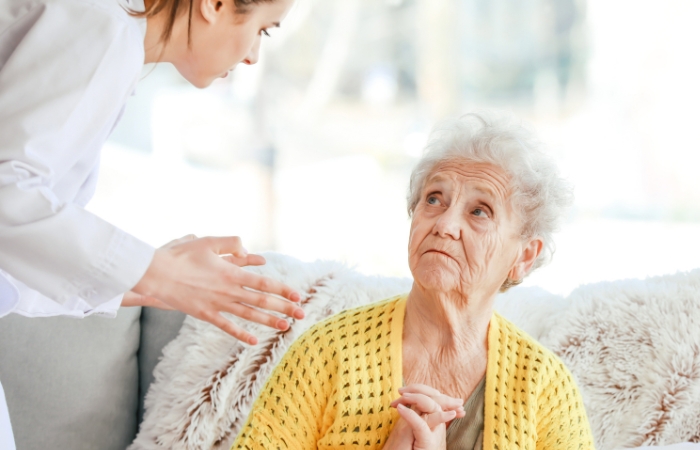
Navigating the care of elderly loved ones is a profound responsibility that demands trust and vigilance. Unfortunately, instances of nursing home abuse have become a distressing reality for many families.
Understanding the various forms of abuse—physical, emotional, financial, and neglect—is crucial in safeguarding the well-being of nursing home residents. Each type of abuse not only violates the dignity of those under care but also underscores the need for awareness and proactive measures.
In this blog, we delve into the alarming prevalence and distinct characteristics of nursing home abuse. From overt acts of physical harm to insidious forms of emotional manipulation, the spectrum of abuse is wide-reaching and often goes unnoticed.
By shedding light on these issues, we aim to empower families and caregivers with the knowledge to recognize warning signs, take decisive action, and advocate effectively on behalf of vulnerable seniors.
Together, let’s explore how to ensure that nursing homes uphold their duty to provide safe, compassionate, and dignified care to our elders.
Physical Abuse
Physical abuse in nursing homes involves any intentional use of force that causes injury or pain to a resident. It can manifest through actions such as hitting, pushing, restraining, or inappropriate use of physical or chemical restraints.
- Definition and Examples: Physical abuse encompasses direct physical harm inflicted on residents, including hitting, slapping, pushing, kicking, or any form of physical force that causes injury.
- Signs and Symptoms: Common signs include unexplained bruises, fractures, sprains, or marks on the body. Residents may exhibit fear or apprehension, particularly around certain staff members. Delayed medical treatment or unexplained injuries should also raise concerns.
- Legal Implications and Reporting Procedures: Victims of physical abuse have legal rights to seek justice and compensation. Families and caregivers should report suspected abuse to authorities and regulatory agencies promptly. Seeking counsel from a personal injury attorney specializing in nursing home abuse cases can provide legal guidance and support in pursuing justice and ensuring the safety of loved ones.
Emotional Abuse
Emotional abuse in nursing homes involves behaviors that inflict anguish, distress, or mental pain on residents, often through non-physical means.
- Definition and Examples: Emotional abuse includes verbal threats, humiliation, intimidation, or isolating residents from social interactions or activities they enjoy.
- Effects on Residents’ Mental Health: Victims of emotional abuse may experience anxiety, depression, withdrawal, or changes in behavior. They may become fearful, distrustful, or exhibit symptoms resembling dementia.
- How to Recognize Emotional Abuse: Watch for signs such as withdrawal, unexplained changes in mood or behavior, fearfulness around certain staff members, and reluctance to communicate openly.
Financial Abuse
Financial abuse in nursing homes involves unauthorized or improper use of a resident’s finances, property, or assets.
- Definition and Examples: Financial abuse can include theft, fraud, forgery of signatures, coercion to change wills or powers of attorney, or unauthorized use of bank accounts or credit cards.
- Impact on Elderly Residents: Victims may suffer financial losses, which can lead to the inability to afford proper care, compromised quality of life, and emotional distress. It can also undermine their trust and sense of security.
- Preventative Measures and Legal Recourse: Prevent financial abuse by monitoring financial accounts, setting up alerts for suspicious transactions, and ensuring legal documents are updated and secure. Seek guidance from a personal injury attorney specializing in nursing home abuse cases if financial abuse is suspected of exploring legal options and protecting the resident’s rights.
Neglect
Neglect in nursing homes refers to the failure to provide adequate care and attention to residents’ essential needs, leading to harm or endangerment.
- Definition and Examples: Neglect can manifest as inadequate nutrition, dehydration, poor personal hygiene, insufficient medical care, or lack of assistance with daily activities.
- Health Consequences: Residents may suffer from malnutrition, dehydration, pressure ulcers (bedsores), infections, untreated medical conditions, or worsening of existing health issues.
- Reporting Neglect and Ensuring Proper Care: If neglect is suspected, report concerns to the nursing home administration, state health department, or adult protective services. Document incidents and advocate for improved care protocols to ensure residents receive the attention and support they require.
Legal Rights and Protections
Nursing home residents have legal rights and protections to ensure they receive proper care and are safeguarded from abuse and neglect.
- Overview of Laws Protecting Nursing Home Residents: Laws such as the Nursing Home Reform Act and state regulations outline residents’ rights to dignity, privacy, proper medical treatment, and freedom from abuse.
- Steps to Take if Abuse is Suspected or Confirmed: Document incidents, gather evidence, and report suspicions of abuse or neglect to authorities and the nursing home administration promptly. Seek advice from an attorney specializing in nursing home abuse cases to understand legal options and pursue justice.
- Role of Legal Professionals in Advocating for Victims: Attorneys can advocate for victims by investigating claims, filing lawsuits for compensation and punitive damages, and holding negligent parties accountable to improve care standards and prevent future abuses.
Ensuring the safety and well-being of nursing home residents is paramount. By understanding the types of abuse—physical, emotional, financial, and neglect—and recognizing the signs, we empower ourselves to take action. Vigilance, advocacy, and legal support are crucial in protecting vulnerable individuals from harm and holding accountable those responsible for their care.




